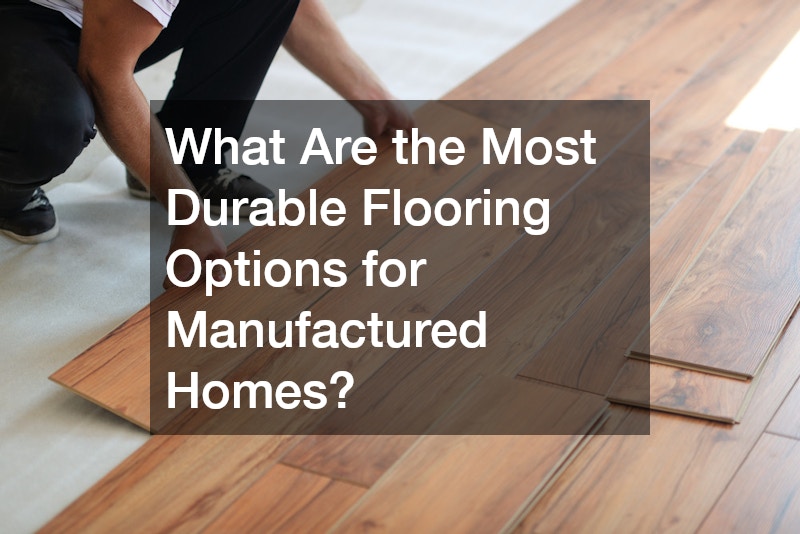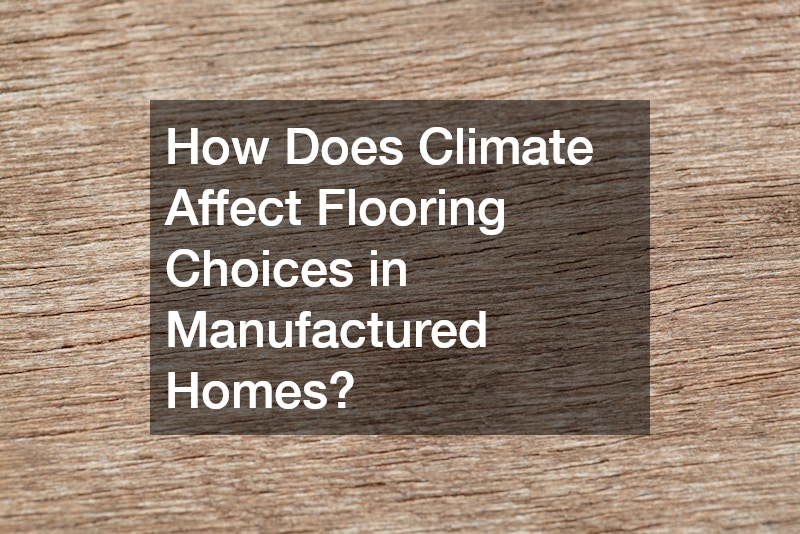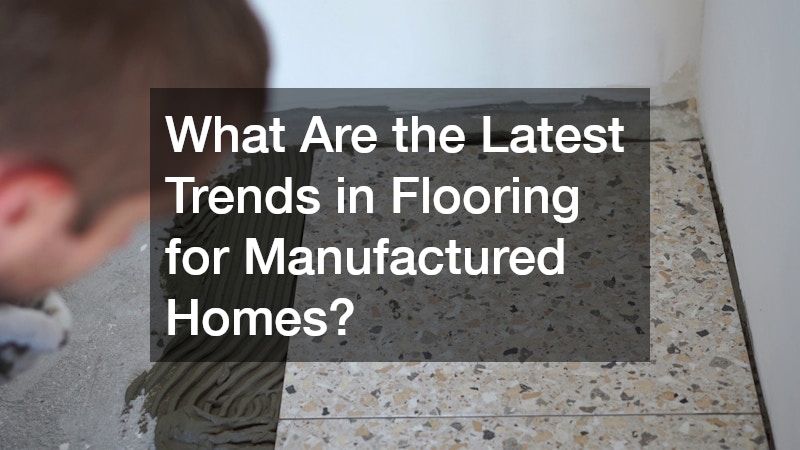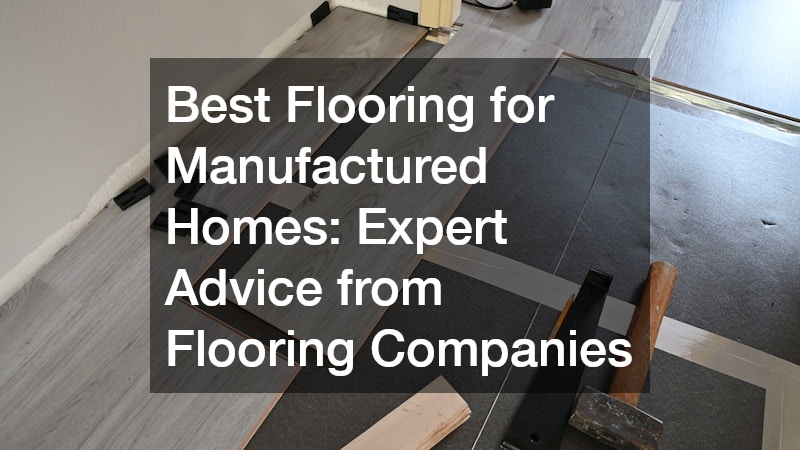Understanding the best flooring options for manufactured homes can have a major impact on how your home feels, functions, and holds its value over time. Flooring isn’t just about appearance—it directly affects comfort underfoot, ease of cleaning, and how well your home stands up to daily wear. Whether you’re replacing outdated carpet in a single room or taking on a full remodel, the material you choose plays a central role in both your immediate living experience and the long-term return on your investment.
Today’s market offers an impressive variety of flooring types, each with its own balance of durability, style, maintenance needs, and price point. Luxury vinyl plank delivers water resistance and modern aesthetics, laminate provides affordable versatility, tile offers unmatched longevity, and sustainable options such as bamboo or cork appeal to eco-conscious homeowners. With guidance from experienced flooring companies and industry professionals, you can sort through these choices to find the perfect fit for your home’s layout, climate, and budget.
Working with a reputable flooring service not only ensures correct installation but also helps you avoid common pitfalls like uneven seams, moisture issues, or premature wear. Professional installers can evaluate your subfloor condition, recommend the best materials for high-traffic areas, and provide advice on protective finishes that extend the lifespan of your floors. This expertise translates to lasting quality, fewer costly repairs, and a smoother overall project.
By making informed decisions and investing in professional support, you can select flooring that elevates your home’s look, feels great to live on, and enhances resale value when it’s time to sell. The right choice turns a simple renovation into an upgrade that benefits your household for years to come.

What Are the Most Durable Flooring Options for Manufactured Homes?
Durability is a major concern in manufactured homes where layouts tend to be compact and traffic patterns are concentrated. Flooring companies often recommend luxury vinyl plank, laminate, and tile for their ideal balance of resilience, style, and cost-effectiveness. Luxury vinyl plank combines the warm look of hardwood flooring with impressive water and scratch resistance. It comes in a variety of price points and is DIY-friendly thanks to click-lock systems, making it appealing to homeowners who prefer to handle projects themselves. However, low-quality vinyl can peel or delaminate over time if the subfloor is not properly prepared. A professional flooring service will ensure a flawless installation, preventing issues like uneven seams or premature wear.
Laminate flooring appeals to homeowners who need an affordable solution without compromising on design variety. Its ability to mimic wood or stone at a fraction of the cost makes it a popular option, but it is not as water-resistant as vinyl. If plumbing leaks or water heater repairs are common in the household, excess moisture can lead to swelling at the seams. Careful sealing, moisture control, and routine inspection of the subfloor are essential to extend its life.
Tile is an excellent choice when long-term resilience is the top priority. Its hard, non-porous surface resists scratches, spills, and stains, making it ideal for kitchens, bathrooms, and laundry areas. The only drawback is that tile can feel cold underfoot, which might be less comfortable in cooler climates. Some home builders or flooring companies recommend adding subfloor heating systems beneath tile to maintain comfort year-round, creating a durable solution that does not sacrifice livability.
Which Flooring Materials Are the Easiest to Maintain?
For busy homeowners, flooring that is easy to maintain can save time and frustration. Low-maintenance options keep the home looking fresh and appealing even while juggling other major projects like home additions or foundation repair. Vinyl flooring is one of the simplest materials to clean and care for. Routine sweeping and an occasional damp mop with a mild cleaner are all that’s needed to keep it looking new. Abrasive pads and harsh chemicals should be avoided, as they may dull the finish. Many modern vinyl floors come with a protective coating that resists scratches and prevents dirt from embedding into textured surfaces.
Hardwood flooring brings timeless beauty to a home, but it requires more attentive upkeep to stay pristine. Homeowners should clean spills promptly, place rugs or mats in high-traffic areas, and consider refinishing every few years to restore shine and protect against wear. A trusted flooring company can suggest durable finishes that add water resistance and improve the floor’s longevity.
Linoleum is another low-maintenance choice that also happens to be eco-friendly. Its natural antibacterial and antistatic properties help resist dirt and dust buildup, a major benefit for households concerned about allergies. Periodic sealing adds moisture resistance and prolongs its lifespan, making linoleum an attractive, sustainable flooring solution.

How Does Climate Affect Flooring Choices in Manufactured Homes?
The local climate significantly influences how flooring performs over time. Extreme temperatures and humidity can lead to swelling, shrinking, or warping if the wrong materials are selected. Wood-based floors are especially prone to expansion and contraction with seasonal changes. Engineered wood and vinyl flooring offer better dimensional stability, helping prevent gaps or buckling in areas that experience both hot summers and cold winters. Flooring services often evaluate local climate conditions before recommending suitable materials to ensure longevity.
High humidity environments can cause solid wood and certain laminates to deteriorate quickly. In such cases, vinyl and tile offer greater resistance to moisture. An HVAC company may also be able to install dehumidifiers or improve ventilation, further protecting the flooring investment.
Coastal homes face additional challenges due to salt air and constant moisture. In these regions, durable, non-porous flooring such as tile or waterproof vinyl is best. Using a basement concrete sealer or a vapor barrier beneath the flooring prevents moisture from penetrating the subfloor, helping protect the structure from long-term salt and water damage.
Are Eco-Friendly Flooring Options Available for Manufactured Homes?
Many homeowners are now prioritizing sustainability when choosing materials. Flooring companies have responded by offering environmentally responsible options that deliver performance and style without compromising eco-values. Bamboo is a leading choice because it grows quickly, regenerates naturally, and provides a warm, wood-like look. Treated bamboo offers excellent moisture resistance and durability, making it practical for manufactured homes.
Floors made from recycled materials—such as reclaimed wood, rubber, or composites—not only reduce environmental impact but also provide unique aesthetics. These floors can withstand heavy use and offer an appealing talking point for environmentally conscious households.
Cork flooring is another standout sustainable option. It feels soft and cushioned underfoot, making it comfortable for long periods of standing. Additionally, cork is mold-resistant and provides natural insulation, which helps regulate indoor temperatures. When paired with efficient HVAC systems, cork can contribute to lower energy costs while maintaining comfort.
What Are the Cost Considerations for Different Flooring Types?
Budget often drives flooring decisions, particularly when homeowners are already investing in other projects like working with home builders on additions or managing water heater repairs. Vinyl and laminate are affordable yet stylish solutions that provide excellent value without exceeding budget limits. These materials allow homeowners to update multiple rooms while keeping expenses manageable.
Tile and hardwood flooring, on the other hand, represent higher initial costs but long-term investments. Their durability and timeless appeal increase property value, making them ideal for those who plan to sell their homes in the future.
Several factors influence the total cost of flooring installation, including the quality of materials, the condition of the subfloor, and labor rates. Professional flooring services can provide accurate quotes after inspecting a home, eliminating surprises and helping homeowners plan more effectively.

What Flooring Best Handles Pets in Manufactured Homes?
Pets can be tough on flooring, so homeowners need materials that can handle scratches, spills, and high energy. Luxury vinyl plank and tile offer excellent scratch resistance, preventing damage from claws or toys. Flooring companies may also suggest additional finishes to further enhance durability.
For stain resistance, sealed laminate and vinyl are easy to wipe clean, even after pet accidents. In contrast, carpeting—while soft—can be harder to maintain in areas like entryways or feeding stations.
When comfort is also a concern, cork and luxury vinyl offer slightly softer surfaces that are gentle on paws and joints without sacrificing durability, making them excellent choices for pet-friendly homes.
How to Choose the Best Flooring for High-Traffic Areas?
Kitchens, living rooms, and hallways experience heavy foot traffic and need flooring that resists wear while maintaining visual appeal. Luxury vinyl plank provides a balance of durability and design, while tile delivers unmatched toughness for high-use areas. Both are excellent for families with children or pets.
Laminate and engineered wood are also practical for high-traffic zones when paired with protective mats at entrances. These options hold up well under regular use without breaking the budget. Using a basement concrete sealer beneath flooring and placing rugs near doorways further protects against dirt, moisture, and grit that can scratch the surface over time.
Are There Flooring Choices That Enhance Home Value?
Flooring is a significant factor in home resale value. Buyers notice high-quality floors and often associate them with overall home care. Professionally installed hardwood flooring remains a standout feature that can attract higher offers.
Tile and natural stone floors also signal premium craftsmanship and long-term durability, particularly in kitchens, bathrooms, and laundry spaces.
Modern design trends such as wide-plank styles, light wood tones, and textured finishes appeal to buyers looking for contemporary aesthetics. Flooring companies and home builders often highlight these features to increase market appeal and differentiate a home from competing listings.

What Are the Latest Trends in Flooring for Manufactured Homes?
Flooring trends continue to evolve, with homeowners seeking options that balance function and style. Neutral shades such as gray, beige, and whitewashed wood tones dominate the market. These colors complement many décor styles and create an open, spacious feel, which is especially valuable in smaller manufactured homes.
Technological advancements like waterproof laminates, high-durability coatings, and improved click-lock systems have made flooring easier to install and maintain than ever before. Some innovative products even incorporate smart features, such as sensors that track moisture and temperature, helping to preserve subfloors and maintain indoor comfort—especially when integrated with efficient HVAC systems.
How to Properly Install Flooring in Manufactured Homes?
Even the highest-quality flooring will fail prematurely if not installed correctly. Preparing the home before installation is critical. Subfloors must be level, stable, and dry, and any foundation repair issues should be addressed first. Adding a basement concrete sealer creates an additional moisture barrier, ensuring that the subfloor remains protected.
Professional flooring services handle the entire process, from removing old flooring and prepping the subfloor to cutting, fitting, and sealing the new material. Their expertise reduces waste and ensures a tight, long-lasting installation.
Manufactured homes can present unique challenges, such as uneven subfloors or shifting frames. Experienced flooring companies know how to overcome these issues, ensuring that the finished floor remains durable and beautiful for years to come.
Conclusion
Choosing the right flooring for a manufactured home involves balancing style, durability, ease of maintenance, and cost in a way that suits both your lifestyle and long-term plans for the property. Each option—whether luxury vinyl plank, laminate, ceramic tile, or sustainable alternatives such as bamboo and cork—offers unique benefits and potential trade-offs. Luxury vinyl, for example, combines affordability with excellent water resistance, making it ideal for kitchens and bathrooms, while tile delivers unmatched longevity but comes with a higher installation cost. Eco-friendly floors like bamboo or cork appeal to homeowners looking to reduce their environmental footprint without sacrificing performance.
Partnering with an experienced flooring service or contractor ensures the subfloor is properly prepared, seams are tight, and the material performs as expected over time. Professional installation can prevent common issues such as warping, uneven wear, or moisture damage that often result from rushed DIY projects. Beyond comfort and visual appeal, high-quality flooring can add tangible resale value to your manufactured home, making it an investment rather than just an upgrade. Choosing wisely also frees up room in your renovation budget for other critical improvements, such as upgrading your HVAC system for better energy efficiency, replacing an aging water heater, or completing foundation repairs to protect your home’s structure.
By understanding the strengths and limitations of different flooring materials and working closely with professionals who know how to address the unique characteristics of manufactured homes, you can create a living space that is both beautiful and built to last. This thoughtful approach ensures your flooring withstands daily use, supports future resale, and complements the rest of your home improvement priorities.
